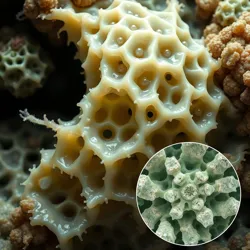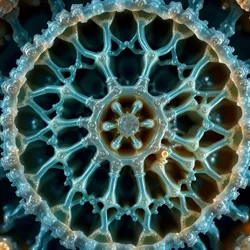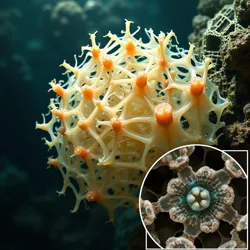Mucus Matrices
Mucus Matrices are complex biological structures created by various species through the strategic deployment and arrangement of specialized mucus secretions. These remarkable formations serve multiple purposes in nature, from defensive barriers to communal habitats.
 A complex mucus matrix created by a colony of Gelatinous Architects
A complex mucus matrix created by a colony of Gelatinous ArchitectsStructure and Formation
Mucus matrices are typically composed of multiple layers of Protein-Enhanced Slime that hardens into semi-permanent structures through a process known as Bio-Crystallization. The resulting formations can span several meters in diameter and often incorporate various environmental materials for additional structural support.
Types and Functions
Different species create distinct types of mucus matrices:
-
Defensive matrices: Created by creatures like the Barrier Slug to ward off predators
-
Communal habitats: Constructed by colonial species for shared living spaces
-
Hunting networks: Used by predatory species to trap prey
-
Environmental filters: Developed by aquatic species to collect nutrients from water
 Microscopic view of a matrix's crystalline structure showing intricate filtering chambers
Microscopic view of a matrix's crystalline structure showing intricate filtering chambersEcological Significance
Mucus matrices play vital roles in various ecosystems by:
- Providing shelter for smaller organisms
- Filtering environmental toxins from water systems
- Creating Microhabitat Zones that support diverse species
- Contributing to nutrient cycling in aquatic environments
Notable Matrix Builders
Several species are renowned for their matrix-building capabilities:
- Architectural Gastropods
- Network Weavers
- Crystal Slime Colonies
Scientific Applications
Research into mucus matrices has led to developments in:
- Biodegradable building materials
- Natural filtration systems
- Biomimetic Architecture
- Sustainable shelter design
 Time-lapse capture of matrix construction by a colony of Network Weavers
Time-lapse capture of matrix construction by a colony of Network WeaversConservation Concerns
The destruction of mucus matrices through environmental pollution and habitat destruction threatens numerous species that depend on these structures. The Matrix Ecosystem Protection Initiative works to preserve these unique biological structures.
See Also
- Biological Architecture
- Natural Adhesives
- Colony Structures
- Filtration Systems in Nature
References
- Journal of Biological Structures
- Matrix Biology Quarterly
- Biomimetic Engineering Review